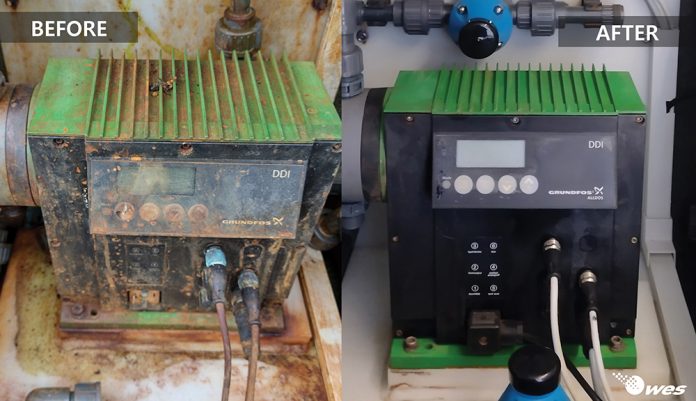Good maintenance of chemical dosing systems is essential to meeting increased water quality compliance challenges. Graham Ward of WES has some money-saving and environmentally sound advice on this subject for water companies and contractors
The water industry’s current Asset Management Period, AMP7, has seen a tightening of legislation on removal of phosphorus from wastewater. It aims to reduce eutrophication – nutrient over-enrichment of lakes, rivers and other surface waters, which generates algal blooms.
Chemical dosing is a critical element of the necessary treatment. With stricter, lower limits on phosphorus levels, dosing systems are now being introduced at many smaller treatment works which previously had no such requirement. Each needs to be properly maintained if its operation is to remain compliant and cost-effective.
Beware of false economy
Cutting corners on maintenance makes breakdowns, unplanned downtime and extra repair bills more likely. A poorly serviced system may also run inefficiently and measure inaccurately, leading to higher energy consumption and wastefully large chemical doses. In addition, any deterioration which allows chemicals to leak can result in costly damage or injury. While these defects increase operating expenditure, poor maintenance also puts pressure on capital expenditure budgets by shortening the equipment’s lifespan.
The same malfunctions threaten the environment too. Underdosing may leave wastewater insufficiently treated, while overdosing can make discharges chemically toxic. Serious faults in the equipment could lead to significant chemical leakage, or discharge of untreated wastewater, directly into natural habitats. Its impacts might include large fines, enforcement undertakings, remedial works and damaged reputations.
The value of maintenance and audits
Dosing systems need at least an annual scheduled maintenance visit. This should cover planned servicing of pumps and other components, as well as checks on calibration, condition and functioning. Further preventative maintenance measures may include additional ‘health check’ visits during the year, in which components are cleaned and tested to ensure they are in good order and performing optimally.
A good provider will carry out an initial site survey to determine the equipment’s maintenance needs, which vary greatly according to site conditions, applications and set-ups. The operator will then be offered an appropriate choice of service packages, such as one of WES’ Gold, Silver or Bronze schemes.
In addition, dosing equipment should be audited regularly to ensure its specification still meets the application’s requirements. There may have been changes in, for example, the volume or content of the wastewater being treated, or the chemicals used. Altering the system’s configuration to suit the new conditions can increase its effectiveness, economy and longevity.
If a system has not been reviewed for some time, an audit should be requested to assess its fitness. This will identify any work needed to rectify damage and deterioration. It should also identify aspects which no longer meet current asset standards. Systems can often be brought up to date by upgrading key components.
Solutions for tricky sites
When choosing dosing equipment for one of the smaller sites which now require dosing equipment, it makes sense to consider the costs of installation and ongoing maintenance. These sites tend to be unmanned, remote from specialist engineering staff, hard to access, with little space or scope for positioning of equipment, and without buildings to protect equipment from the weather.
Today there are compact packaged dosing systems which overcome these difficulties. Their low weight, small footprint and pre-assembled, pre-tested configuration makes installation easy and expands location choice. They come with inbuilt weather protection and are designed to operate with minimal maintenance intervention, save for scheduled maintenance.
For further information on phosphorus removal and dosing system maintenance, detailed white papers can be found under Resources/Downloads at www.wes.ltd.uk
Graham Ward is Business Development Director at dosing system specialist WES Ltd.



